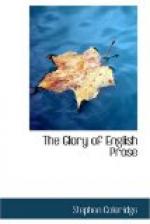“Two men I honour, and
no third. First the toilworn Craftsman that
with earth-made implement
laboriously conquers the earth, and
makes her man’s.
“Venerable to me is the hard hand; crooked, coarse; wherein notwithstanding lies a cunning virtue indefeasibly royal, as of the sceptre of this planet. Venerable too is the rugged face, all weather-tanned, besoiled, with its rude intelligence; for it is the face of a man living manlike. Oh, but the more venerable for thy rudeness, and even because we must pity as well as love thee! Hardly-entreated brother! For us was thy back so bent, for us were thy straight limbs and fingers so deformed; thou wert our conscript, on whom the lot fell, and fighting our battles wert so marred. For in thee too lay a god-created form, but it was not to be unfolded; encrusted must it stand with the thick adhesions and defacements of labour; and thy body, like thy soul, was not to know freedom. Yet toil on, toil on; thou art in thy duty, be out of it who may: thou toilest for the altogether indispensable, for daily bread.
“A second man I honour, and still more highly: him who is seen toiling for the spiritually indispensable; not daily bread, but the bread of life. Is not he too in his duty; endeavouring towards inward harmony; revealing this, by act or by word, through all his outward endeavours, be they high or low? Highest of all, when his outward and his inward endeavour are one: when we can name him artist; not earthly craftsman only, but inspired thinker, who with heaven-made implement conquers heaven for us! If the poor and humble toil that we have food, must not the high and glorious toil for him in return, that he have light, have guidance, freedom, immortality? These two, in all their degrees, I honour; all else is chaff and dust, which let the wind blow whither it listeth.
“Unspeakably touching is it, however, when I find both dignities united; and he that must toil outwardly for the lowest of man’s wants, is also toiling inwardly for the highest. Sublimer in this world know I nothing than a peasant saint, could such now anywhere be met with. Such a one will take thee back to Nazareth itself; thou wilt see the splendour of heaven spring forth from the humblest depths of earth, like a light shining in great darkness.”
Sartor Resartus has long taken its place among the greatest prose works of the nineteenth century, and it is a strange commentary on this mandate to us all to “produce, produce!” to find that for eleven years Carlyle could find no publisher who would give it in book form to the world!
It is a solemn reflection to think that there may be many books of eloquence and splendour that have never seen the light of publicity. Publishers concern themselves less with what is finely written than with what will best sell; and in their defence it may be acceded that some of the masterpieces of literature have at their first appearance before the world fallen dead from the press.




